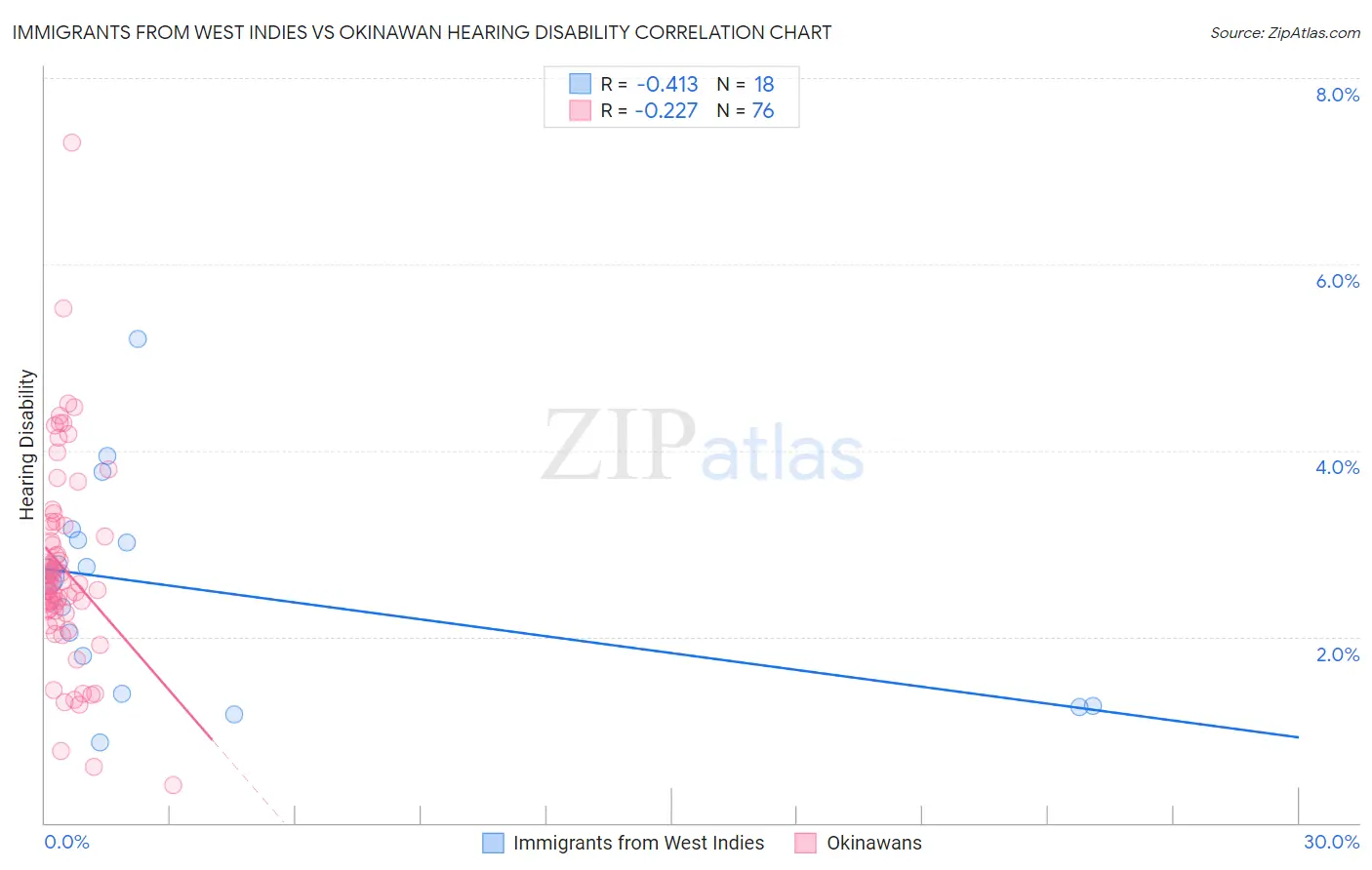Immigrants from West Indies vs Okinawan Hearing Disability
COMPARE
Immigrants from West Indies
Okinawan
Hearing Disability
Hearing Disability Comparison
Immigrants from West Indies
Okinawans
2.5%
HEARING DISABILITY
99.9/ 100
METRIC RATING
16th/ 347
METRIC RANK
2.6%
HEARING DISABILITY
99.6/ 100
METRIC RATING
36th/ 347
METRIC RANK
Immigrants from West Indies vs Okinawan Hearing Disability Correlation Chart
The statistical analysis conducted on geographies consisting of 72,456,124 people shows a moderate negative correlation between the proportion of Immigrants from West Indies and percentage of population with hearing disability in the United States with a correlation coefficient (R) of -0.413 and weighted average of 2.5%. Similarly, the statistical analysis conducted on geographies consisting of 73,759,317 people shows a weak negative correlation between the proportion of Okinawans and percentage of population with hearing disability in the United States with a correlation coefficient (R) of -0.227 and weighted average of 2.6%, a difference of 3.7%.

Hearing Disability Correlation Summary
| Measurement | Immigrants from West Indies | Okinawan |
| Minimum | 0.87% | 0.40% |
| Maximum | 5.2% | 7.3% |
| Range | 4.3% | 6.9% |
| Mean | 2.5% | 2.7% |
| Median | 2.6% | 2.6% |
| Interquartile 25% (IQ1) | 1.4% | 2.3% |
| Interquartile 75% (IQ3) | 3.0% | 3.2% |
| Interquartile Range (IQR) | 1.6% | 0.90% |
| Standard Deviation (Sample) | 1.1% | 1.1% |
| Standard Deviation (Population) | 1.1% | 1.1% |
Demographics Similar to Immigrants from West Indies and Okinawans by Hearing Disability
In terms of hearing disability, the demographic groups most similar to Immigrants from West Indies are Immigrants from India (2.5%, a difference of 0.32%), Dominican (2.5%, a difference of 1.0%), Thai (2.5%, a difference of 1.0%), Immigrants from Bolivia (2.5%, a difference of 1.1%), and Ghanaian (2.5%, a difference of 1.2%). Similarly, the demographic groups most similar to Okinawans are Salvadoran (2.6%, a difference of 0.22%), Immigrants from Pakistan (2.6%, a difference of 0.35%), Filipino (2.6%, a difference of 0.39%), Immigrants from Venezuela (2.6%, a difference of 0.65%), and Immigrants from Cameroon (2.6%, a difference of 0.79%).
| Demographics | Rating | Rank | Hearing Disability |
| Immigrants | West Indies | 99.9 /100 | #16 | Exceptional 2.5% |
| Immigrants | India | 99.9 /100 | #17 | Exceptional 2.5% |
| Dominicans | 99.8 /100 | #18 | Exceptional 2.5% |
| Thais | 99.8 /100 | #19 | Exceptional 2.5% |
| Immigrants | Bolivia | 99.8 /100 | #20 | Exceptional 2.5% |
| Ghanaians | 99.8 /100 | #21 | Exceptional 2.5% |
| Immigrants | Sierra Leone | 99.8 /100 | #22 | Exceptional 2.6% |
| Immigrants | Nigeria | 99.8 /100 | #23 | Exceptional 2.6% |
| Immigrants | Ghana | 99.8 /100 | #24 | Exceptional 2.6% |
| Immigrants | El Salvador | 99.7 /100 | #25 | Exceptional 2.6% |
| Immigrants | Senegal | 99.7 /100 | #26 | Exceptional 2.6% |
| Immigrants | South Central Asia | 99.7 /100 | #27 | Exceptional 2.6% |
| Immigrants | Haiti | 99.7 /100 | #28 | Exceptional 2.6% |
| Bolivians | 99.7 /100 | #29 | Exceptional 2.6% |
| Immigrants | Caribbean | 99.7 /100 | #30 | Exceptional 2.6% |
| Immigrants | Cameroon | 99.7 /100 | #31 | Exceptional 2.6% |
| Immigrants | Venezuela | 99.7 /100 | #32 | Exceptional 2.6% |
| Filipinos | 99.6 /100 | #33 | Exceptional 2.6% |
| Immigrants | Pakistan | 99.6 /100 | #34 | Exceptional 2.6% |
| Salvadorans | 99.6 /100 | #35 | Exceptional 2.6% |
| Okinawans | 99.6 /100 | #36 | Exceptional 2.6% |